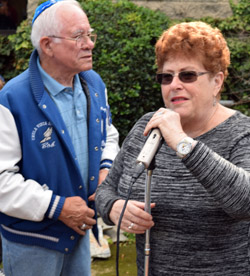
By Donald H. Harrison


SAN DIEGO– Valencia and Meyer Etz were enthusiastically adopted by the children of the Abraham and Anne Ratner Torah School at Tifereth Israel Synagogue on Sunday, Jan. 24, the day of Erev Tu B’Shevat. Tending to the needs of the Etzes, the children brought them food and water and even helped Rabbi Leonard Rosenthal say some prayers over them.
The ceremony was part of the Torah school’s celebration of a holiday known as “the birthday of the trees” and as “the Jewish Arbor Day.”
Etz means tree in Hebrew. Valencia is a Valencia Orange tree, while Meyer is a Meyer Lemon Tree. City Farmers Nursery in San Diego donated Valencia, and the Men’s Club and the Sisterhood of Tifereth Israel Synagogue split the modest cost of the Meyer Lemon Tree, with both citrus trees planted on the synagogue grounds for Tu B’Shevat.
Bob Holloway, Men’s Club Vice President and emcee of the event, noted to the children that citrus fruit is filled with Vitamin C “which is good for your body and strengthens your immune system.” He explained that there are minerals and vitamins for the tree in the dirt, but that the dirt needs to be watered in order for the trees root system to use them.
A child asked if it was fair to take the fruit from the trees. Holloway responded that while “the tree can’t use the orange juice, we humans can.”
With that the Torah School children, with shouts of joy, took turns shoveling dirt into the holes previously dug by Men’s Club members. Rabbi Rosenthal quipped, “If you think this is exciting, after Torah school, you can come over and weed my lawn.” Some pupils yelled “no, no,” while one or two others responded, “I’ll do it!”
Afterwards, the rabbi read some citations from the Bible dealing with vegetation, among them: “And God said let the earth put forth grass, herbs bearing seeds and fruit bearing fruit after its kind, and so it was.”
He added: “A person’s life is sustained by trees. Just as someone planted for you, plant for the sake of the children.”
He lead a blessing in praise of The One ‘who continually does the work of creation,” followed by the Shehekiyanu prayer, thanking God for keeping us, sustaining us, and enabling us to plant these trees today.
Judy Gumbiner, Sisterhood president, confided to the children that she has both a Valencia orange tree and a Meyer lemon tree in the back yard of her home, and that her grandchildren “always enjoy coming over and picking the fruit from those trees, and I hope you all enjoy the fruits of your labor.”
On their way back to class, with the admonition to “wash your hands before you eat,” the children were given snack bags containing carob chips, raisings, almonds and dates in celebration of the holiday.
*
Harrison is editor of San Diego Jewish World. He may be contacted via donald.harrison@sdjewishwor.com. Comments intended for publication in the space below must be accompanied by the letter writer’s first and last name and by his/ her city and state of residence (city and country for those outside the U.S.)
Pingback: Tu B’Shevat, Torah School style | The Ruach